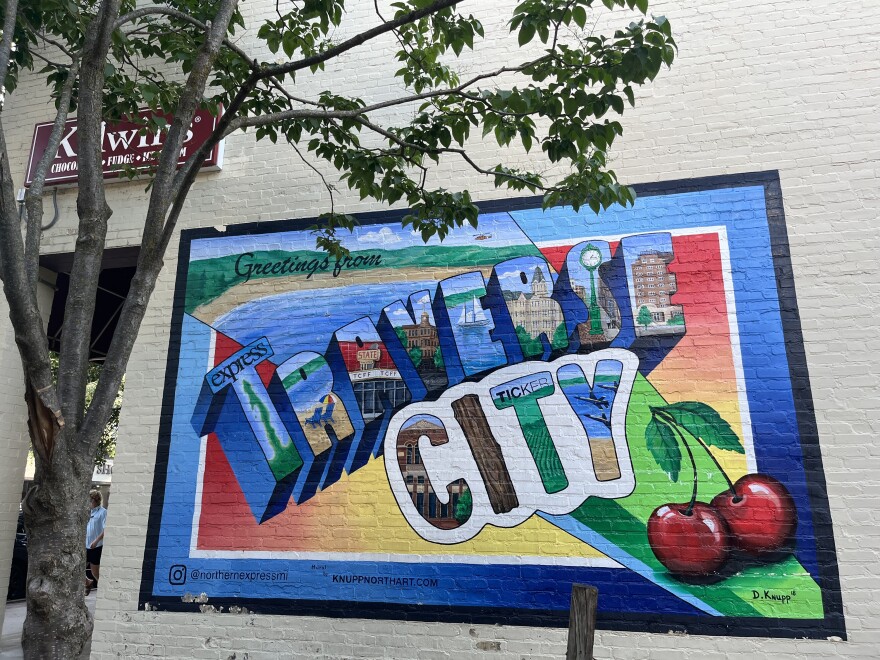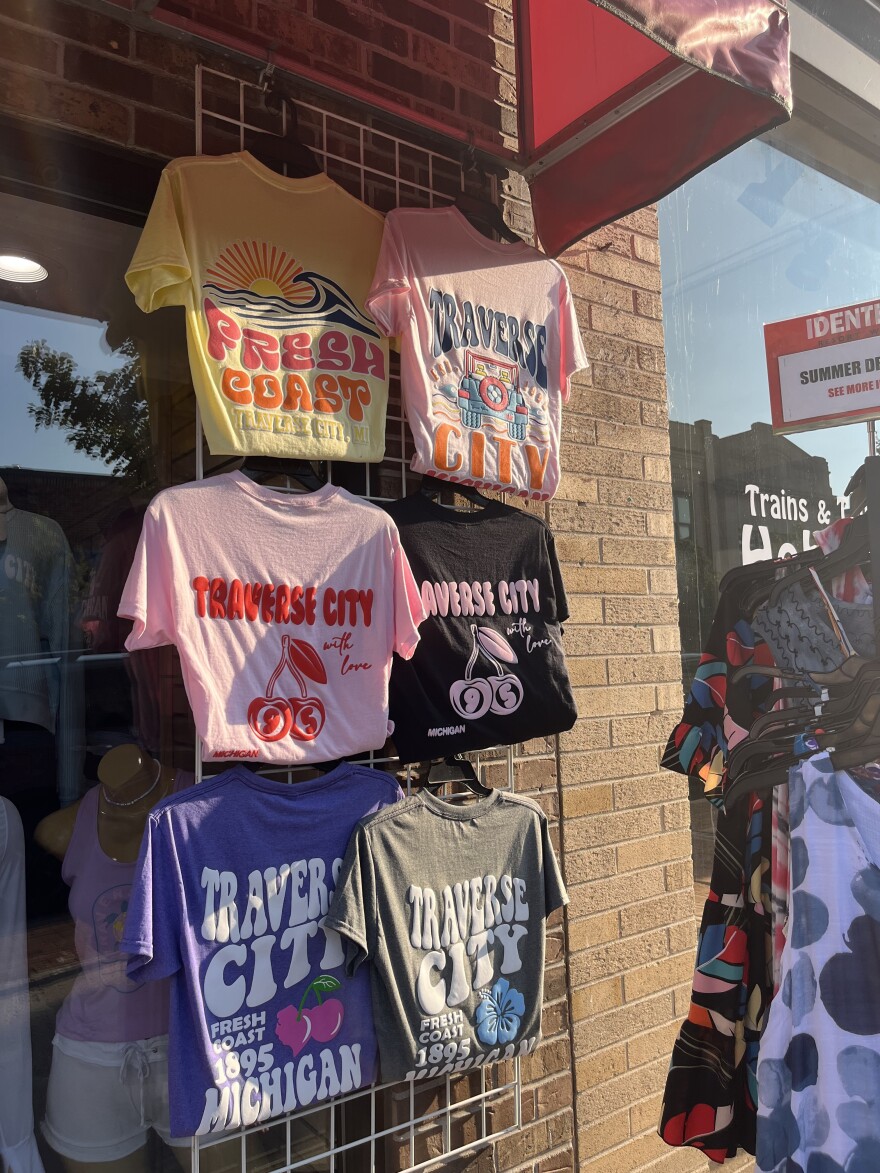Grand Traverse County Sheriff Michael Shea said 911 calls to the county spike in the summer, when many of the estimated 7 million tourists who visit Traverse City every year come to town.
“We're a huge tourist town, and we have a very large influx of visitors, which we welcome,” Shea said. “But it does cause a strain on our calls for service.”
“I don’t think there’s a part of the county budget that isn’t affected by the influx of people who come to the community in the summer,” said TJ Andrews, a Grand Traverse County commissioner.
This reporting is made possible by the Northern Michigan Journalism Project, led by Bridge Michigan and Interlochen Public Radio, and funded by Press Forward Northern Michigan.
Such pull on county services has some calling for a change in state law to give the county a portion of the fee visitors pay when staying in a hotel room or certain short-term rentals. Currently, all of that revenue goes toward tourism promotion, but some Traverse City-area residents such as Andrea Stalf think some money should go toward the roads and emergency services tourists use but don’t directly pay for.
The city’s tourism bureau is “sitting on millions and millions,” said Stalf, who has helped push a petition drive to change how hotel fee revenue is divvied up. “Meanwhile, all the taxpayers around here are trying to fill in the missing asphalt on the roads and deal with the hospital and emergency care system that is broken.”
The 5% fee on hotel stays raised more than $9 million for Traverse City Tourism in 2023, according to the most recent tourism bureau audits available from Pure Michigan. Grand Traverse County’s overall budget is expected to be just over $114 million in 2025.
Across northern Michigan, hotel taxes generated almost $30 million for the region’s convention and visitors bureaus.
Not everyone thinks a change is needed. Some county leaders said they welcome the tourism promotion that brings business to town. Some noted tourists help fund county services through taxes they pay at the gas pump that eventually flow into local coffers and through the hefty property taxes hotel owners pay.
And there’s still work to do on tourism promotion, industry leaders said.
“During the summer months, everybody can feel that we're so busy,” said Trevor Tkach, president of Traverse City Tourism. “I can show you reports from the middle of January where we were at less than 20% occupancy for the week in our hotels.”
Any change to the state law guiding hotel taxes “would take a big lift, no doubt about it,” said state Rep. John Roth, R-Interlochen.
Infrastructure strained by tourism?
Stalf started to wonder about taxes in the Grand Traverse region when she moved there from Connecticut three years ago. Her taxes were just as high in Acme Township as they were in her former town in the New York suburbs, she said.
“The taxes are urban, but the services are rural,” she said.
She came across the hotel assessment fee in her quest to understand her county’s finances.
Stalf has teamed up with Brad Lystra, another Traverse City resident, to put together a petition that circulated earlier this year asking the county commission to capture some revenue from taxing tourists for infrastructure and services. They’ve also reached out to multiple state legislators.
Lystra spent years working in energy tax policy and is well-versed in sifting through complicated municipal finances. He travelled around the county for work before settling in Traverse City.
“I was keenly aware of the hotel tax laws that were on the books. You stay in Indianapolis or Chicago or Dallas, and invariably, there was always a tax, and you’d look at it and learn how those monies were being allocated and spent,” he explained.
Chicago, for example, charges a 17% hotel tax that goes to the state budget, the county budget and the city budget.
“I was really surprised when I came to Traverse City and saw that we had a tax like this but it was just solely dedicated to promotion,” Lystra said. “When we travel to New York, Chicago, Houston or other parts of the country, we are paying a tax that is not reciprocal when people from other parts of the country come up to Michigan.”
Since connecting on social media, the two have been working together to speak out about what they see as a problem in Michigan’s tax codes. They propose allowing counties like Grand Traverse to split the hotel fee revenue between tourism marketing bureaus and county governments, but they prefer to leave the finer details to legislators.
Not everyone in the state sees a problem that needs fixing.
“I don't really foresee a strain on our county budget with the tourists here,” said Emmet County Commissioner Brian Gutowski. “I don't think we're like Traverse City.”
For taxing tourists, control lies in Lansing
Andrews, the Grand Traverse county commissioner, said she’d like to see at least part of the money from hotel room fees flow into the county budget.
But, as a county commissioner, her hands are tied.
“Without a change in state law, the county commission can't say, ‘We're going to now change how hotel taxes are collected or how they're spent.’”

That’s because of Public Act 59 of 1984. The law says local tourism boards can set a fee that hotels in their district must pay to the board. Most hotels pass the fee along to visitors, and it’s capped at 5% of the room charge. The law is specific about using that money only for promotion and marketing organizations in the area where it’s collected. No other uses are allowed without permission from lawmakers.
Lawmakers have granted other uses for the tax. They’ve allowed Kent County, for example, to levy two taxes on hotel room bills: a 4% assessment sent to the local tourism board, as is outlined in Public Act 59, and an 8% tax that goes to the county. Until last year, that tax went exclusively toward paying off bonds that built a convention center in Grand Rapids. In 2024, the tax was raised to pay for a new amphitheater and soccer stadium.
All those tax adjustments were set at the state level.
Grand Rapids’ increased hotel tax hasn’t deterred visitors, according to the local convention and tourism bureau.
“We are having a really great summer,” said Janet Korn, senior vice president of Strategic Initiatives at Experience Grand Rapids. “All indications are that (Grand Rapids) has remained a popular travel destination.”
Colorado, another state with a substantial tourist economy, used to have a system similar to Michigan’s, in which taxes on hotel rooms went solely to marketing and promotion.
But Colorado lawmakers passed legislation earlier this year allowing counties to raise their lodging taxes and put money toward public infrastructure, public safety, fire protection services and emergency medical services — if local voters in that county approve. That’s after they expanded their lodging tax laws in 2022 to support housing and childcare in some counties.
Roth, the Michigan state lawmaker, said the idea of changing the tourism tax structure across the whole state has been raised in the Michigan Legislature.
“Some are saying they would like to see some (money) go to infrastructure,” he said. “There's been conversation about that in the state for a few years now. Unfortunately, it hasn't gone anywhere at the state level.”
He says that, although it’s not one of his legislative priorities right now, he is interested in the idea of allowing a tourist tax to pay for local infrastructure and services.
“It just takes good movement, good conversations amongst all the groups … getting all these groups to sit down and just discuss it … tourism with counties and cities and villages, to make sure they're all on board,” said Roth.
He said his biggest concern would be keeping things consistent across the state. He wouldn’t want to see one place in northern Michigan hike its fees significantly, which he worried might deter people from the region overall.
Where does the hotel assessment money go now?
Tkach, the director of Traverse City Tourism, said the hotel room assessment operates exactly as it was designed: money charged by the tourism industry supports that industry.

“If you look back at the history, the initial assessment model that was created in the state was actually modeled after agriculture,” he explained. “Different sectors, like cherries, do this very thing. They collect a penny per pound, or however they do it, and then that goes back into a marketing fund that helps them do research or campaigns and drives more demand for their product.”
Tkach said his agency is devoting its efforts right now to promoting off-season travel, and that it’s spending money in ways that benefit the community at large. The tourism bureau recently contributed $1 million toward a new indoor sports complex operated by the Traverse City school system, which tourism officials hope will also draw visitors for winter sports tournaments.
According to Tkach, the marketing his agency does is key to sustaining, not growing, Traverse City’s reputation.
“If we aren't keeping our name front and center with potential travelers, there's a whole world of competition out there,” he said. “To take the foot off the gas potentially gives competitors an opportunity to take our market share.”
EDITOR’S NOTE: This story was updated at 1:30 p.m. Nov. 5, 2025 to reflect that tourism boards, not municipalities, typically levy hotel room assessments that fund tourism promotion.







